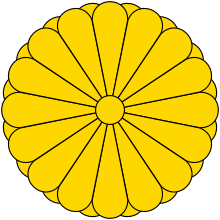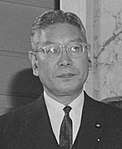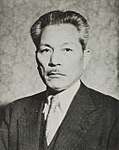1962 Japanese House of Councillors election
House of Councillors elections were held in Japan on 1 July 1962,[1] electing half the seats in the House. The Liberal Democratic Party won the most seats.
| |||||||||||||||||||||||||||||||||||||||||||||||||||||||||||||||||||||
125 (of the 250) seats in the House of Councillors 126 seats needed for a majority | |||||||||||||||||||||||||||||||||||||||||||||||||||||||||||||||||||||
|---|---|---|---|---|---|---|---|---|---|---|---|---|---|---|---|---|---|---|---|---|---|---|---|---|---|---|---|---|---|---|---|---|---|---|---|---|---|---|---|---|---|---|---|---|---|---|---|---|---|---|---|---|---|---|---|---|---|---|---|---|---|---|---|---|---|---|---|---|---|
| |||||||||||||||||||||||||||||||||||||||||||||||||||||||||||||||||||||
| |||||||||||||||||||||||||||||||||||||||||||||||||||||||||||||||||||||
 |
|---|
| This article is part of a series on the politics and government of Japan |
|
|
|
|
Results
| Party | Constituency | National | Total seats | |||||
|---|---|---|---|---|---|---|---|---|
| Votes | % | Seats | Votes | % | Seats | |||
| Liberal Democratic Party | 17,112,986 | 47.1 | 48 | 16,581,637 | 46.4 | 21 | 69 | |
| Japan Socialist Party | 11,917,675 | 32.8 | 22 | 8,666,910 | 24.2 | 15 | 37 | |
| Democratic Socialist Party | 2,649,422 | 7.3 | 1 | 1,899,756 | 5.3 | 3 | 4 | |
| Clean Government League | 958,179 | 2.6 | 2 | 4,124,269 | 11.5 | 7 | 9 | |
| Japanese Communist Party | 1,760,258 | 4.8 | 1 | 1,123,947 | 3.1 | 2 | 3 | |
| Dōshikai | 128,834 | 0.4 | 0 | 1,660,466 | 4.6 | 2 | 2 | |
| Other parties | 58,622 | 0.2 | 0 | 295,603 | 0.8 | 0 | 0 | |
| Independents | 1,725,947 | 4.8 | 2 | 1,404,048 | 3.9 | 1 | 3 | |
| Invalid/blank votes | - | - | - | - | - | |||
| Total | 36,311,923 | 100 | 76 | 35,756,635 | 100 | 51 | 127 | |
| Source: Ministry of Internal Affairs and Communications | ||||||||
gollark: I, personally, blame Macron.
gollark: This is interesting! I'm testing ways to improve the performance/memory use of the Minoteaur inevitable semantic search thing, and it turns out that using a dimensionality reduction thing on the embedding vectors makes some searches turn out identically, and some using rare keywords like "apioform" turn out poorly.
gollark: Obviously minoteaur will include "counter" capabilities.
gollark: Well, your perception of it can be changed, and it might be beelike perception.
gollark: Oh BEE, this only captures 66% of variance in the data!
References
This article is issued from Wikipedia. The text is licensed under Creative Commons - Attribution - Sharealike. Additional terms may apply for the media files.


